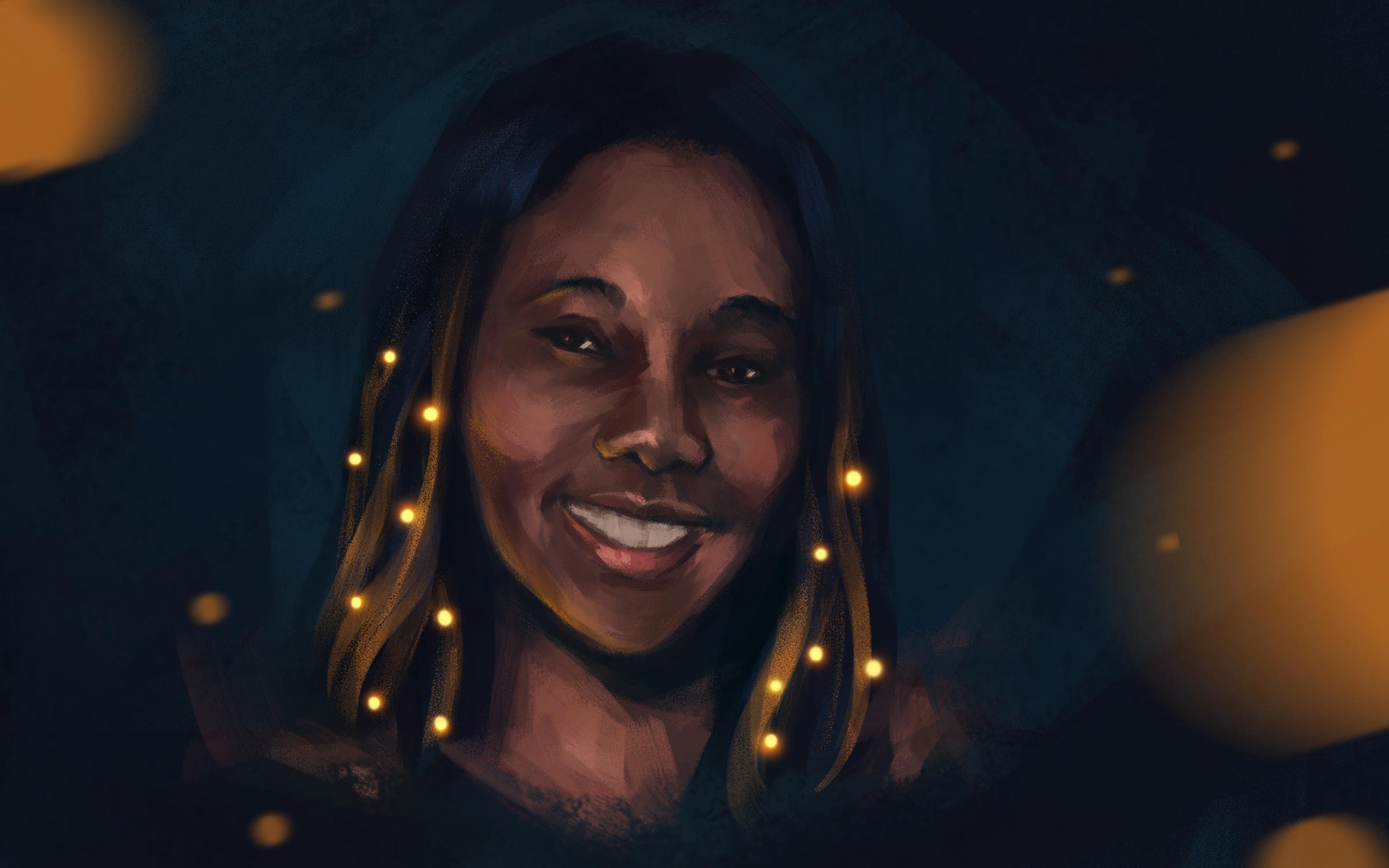As the trial continues, there are still many unanswered questions
 Illustration: Bimpe Alliu
Illustration: Bimpe Alliu
The legacy of the Atlanta Police Department?s lack of care for missing young Black people has a long history that is best highlighted in the current HBO series Atlanta?s Missing and Murdered. While Mayor Keisha Lance Bottoms and Police Chief Erika Shields are attempting to rectify these haunting mistakes 40 years later with new investigations, those failures are ever present.
One recent case that called attention to the systemic failures of multiple institutions ? and their propensity for finger-pointing ? is that of Alexis Crawford.
A senior at Clark Atlanta University, Alexis ?Lex? Crawford, 21, was a criminal justice major living with her friend and roommate, Jordyn Jones, in 2019. Though many close friends knew the two women had issues within their friendship, they spent homecoming celebrating and socializing together as the fall semester came to a close. However, their seeming reconciliation was short-lived. On October 26, the two had a falling out that, it was later discovered, had deadly implications. Shortly after their altercation, Crawford went missing. Her body was found a week later, on November 8, in Exchange Park.
In Atlanta, missing Black women and girls are a regular occurrence. Just days after Crawford?s disappearance, a young woman named Lateisha Edwards went missing for seven days. Luckily, she was found and returned home safely, but there are still thousands of cases of Black women who are listed as missing or runaways in the Georgia Bureau of Investigation that remain unsolved.
Search parties for Crawford across southwest Atlanta were led by friends and family who felt like the Atlanta Police Department was not taking Crawford?s disappearance seriously. ?If we the citizens have to be detectives and mentors and have to do the forensic files, then that?s what we?re gonna do,? said Sabrina Peterson, a local activist and mentor who spearheaded the search for Crawford in early November. Dozens of volunteers from all across Atlanta gathered, looking for any clues that could help locate Crawford?s whereabouts. While searches continued up until November 7, many were still hopeful that Crawford would be returned safely.
On November 8, Jones confessed to assisting in the murder and death of her roommate, alongside her boyfriend, Barron Brantley. Both Jones and Brantley have pled not guilty to charges of murder, two counts of felony murder, aggravated assaults, false imprisonment, and concealing the death of another.
Homecoming at historically black colleges and universities is special, but in Atlanta, it?s something different. The Atlanta University Center Consortium is the largest consortium of HBCUs in the country. Set in Atlanta?s West End community, the consortium includes Spelman College, Morehouse College, Clark Atlanta University, and the Morehouse School of Medicine. Every day during homecoming season, there is a party to go to, leading to the most important day of the year: the tailgate at the Morehouse football game. Hosting 6,000-plus Black students, suffice it to say that when homecoming season comes around at the end of October, the air feels vibrant.
Clark Atlanta University released a statement on November 8, after information about Crawford?s body being found was released to the public: ?Investigators say this was an isolated, off-campus incident and there was never a threat to any other members of the community.?
While the murder of Alexis Crawford was isolated in that neither student lived on campus, it is clear that Clark Atlanta would not be a safe space for survivors of sexual violence to report assaults: The institution is currently under a Title IX lawsuit for its handling of reported cases of violence experienced by students both on and off campus.
Tayler Mathews, a PhD student, filed a civil rights lawsuit against Clark Atlanta for mishandling her reports of sexual harassment by a male graduate student. ?I didn?t want to take it here,? she said of a civil rights lawsuit against the university she filed in August 2017, saying it didn?t properly handle her sexual harassment complaints. ?I really thought they would take care of this,? Mathews told the Atlanta Journal-Constitution about her case and the ways that Clark Atlanta hindered her graduate school performance due to retaliation from faculty and staff. There has been an uptick in HBCU students across the country asking their institutions to show up for survivors, especially in high-risk times of violence such as homecoming.
Based on police records, after returning from the tailgate with Jordyn Jones, her boyfriend, Barron Brantley, allegedly sexually assaulted Alexis Crawford in her bathroom on October 26, 2019. What followed was a spiral of chaos at the household on McDaniel Street, located minutes from Clark Atlanta University. As Jones found Brantley assaulting Crawford, Brantley reportedly said, ?I didn?t touch her. I didn?t rape her.? Reports say that Crawford was unconscious during this attack; when she awakened, she disclosed the assault to a close friend after arguments ensued between Jones and Brantley about the alleged attack. That friend then called the police, and Crawford was able to get a rape kit administered that same night at Grady Hospital.
In the midst of this, while arguing with Brantley, Jones stormed out of the house, and Brantley took Jones? keys and car. After Jones reported the car stolen, she and Brantley reconciled hours later that evening, and he subsequently snuck back into the shared apartment without Crawford?s knowledge. Four days later, on Halloween night, Crawford and Jones got into another argument about Crawford?s assault, which resulted in Brantley coming out of hiding in Jones? room and allegedly choking Crawford to death.
A 2017 report from the Centers for Disease Control and Prevention compiled from data in the National Violent Death Reporting System found that the homicide rate for Black women from 2003 to 2014 was 4.4 per 100,000, with Native American women at 4.3 per 100,000. The report also found that 55% of those deaths were related to partner violence, and the vast majority of those were carried out by a male partner. While we don?t know all of exactly what occurred with Jones and Brantley that night, reports state that the main rupture of Jones? friendship with Crawford was the continued emotional abuse Jones endured and the unchecked sexual harassment Crawford experienced, all at the hands of Brantley.
At the vigil for Crawford, hundreds of Clark Atlanta students gathered on the promenade in front of the student center to honor the life of a student who should?ve been worried about final exams, just like them. As campus police, the Atlanta Police Department, school officials, and close friends spoke about the life of this young woman, many also spoke to the pervasive nature of distrust between Crawford and Jones.
?A lot of students have been trying to take in what happened and try to find answers to something we can?t find answers to,? said Levon Campbell Jr., undergraduate president of the Student Government Association at Clark Atlanta. ?The mood has been very hard.?
Students still feel immense worry about what Crawford?s death means for their own well-being on campus. ?I?m not really sure how other people are reacting to it or how they are feel about it, but it makes me feel kind of uneasy,? said Camille Dash, a Clark Atlanta student, to 11Alive.
?The reasoning for why these institutions cannot resolve these issues has led to larger conversations about poor funding to HBCUs, the seeming lack of understanding of restorative justice to those accused of sexual violence, expectations regarding who carries the weight of Black liberation ? women and queer folks ? and how administrations of HBCUs nationally are run by an old guard,? said Spelman student Clarissa Brooks in a 2017 op-ed in Teen Vogue.
Nothing happens in isolation. The death of a Black woman in her prime does not happen without the failure of multiple systems that are supposed to protect those who have experienced harm. Living in a world that already sees Black women as disposable and unworthy of being victims of violence is the cause for lack of reporting. It is the reason Black women endure experiences of violence for the sake of not wanting to be victimized in ways that could cause them secondary harm.
The trial for Alexis Crawford?s murder is ongoing, but she deserved better in every sense of the word. Her life is not an example of isolated violence, but a testimony on how institutions use survivors? lives as fodder to point the finger of blame somewhere else.
This story was produced with support from Press On and the Freedomways Reporting Project, a fellowship program for journalists in the U.S. South whose reporting advances justice.

